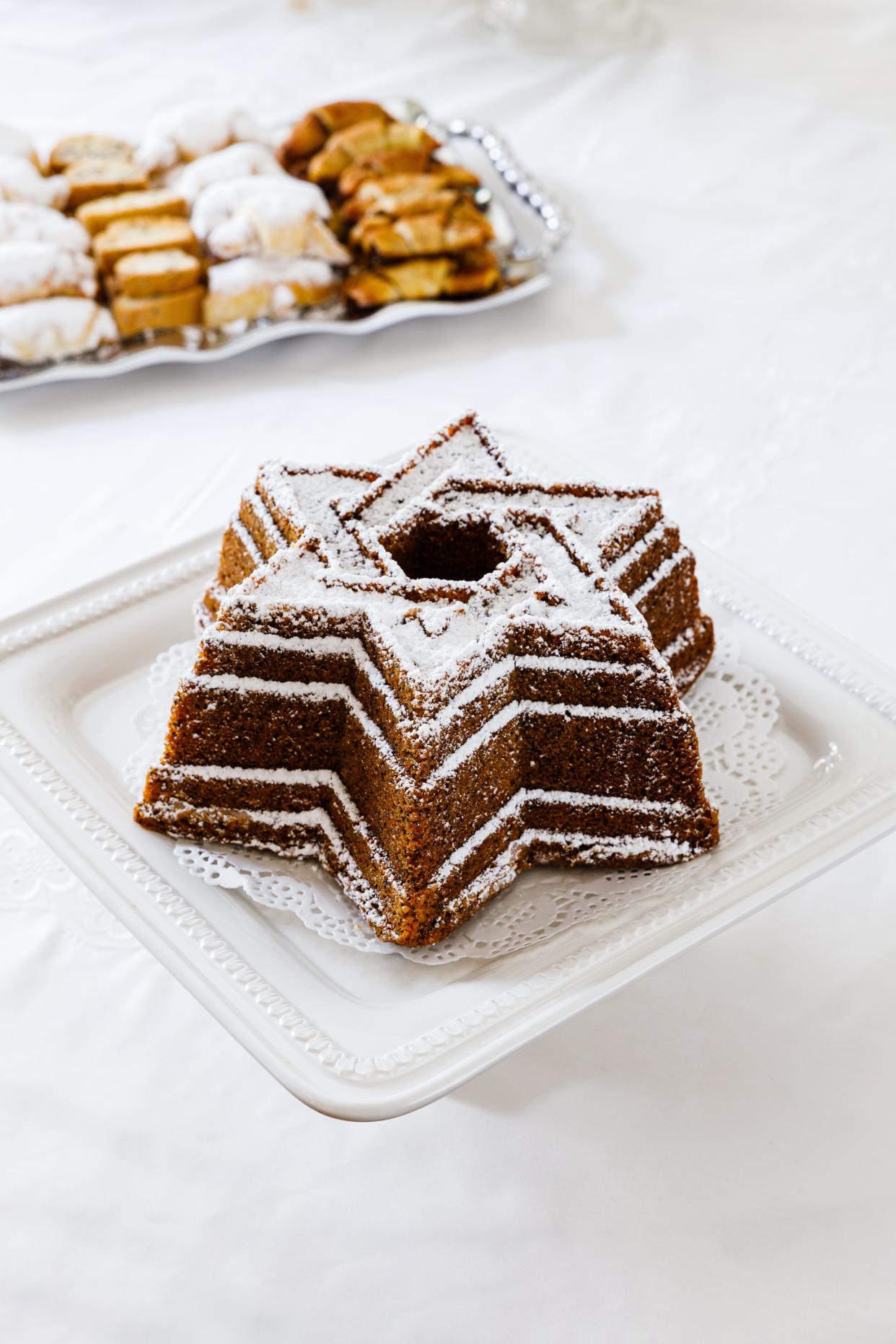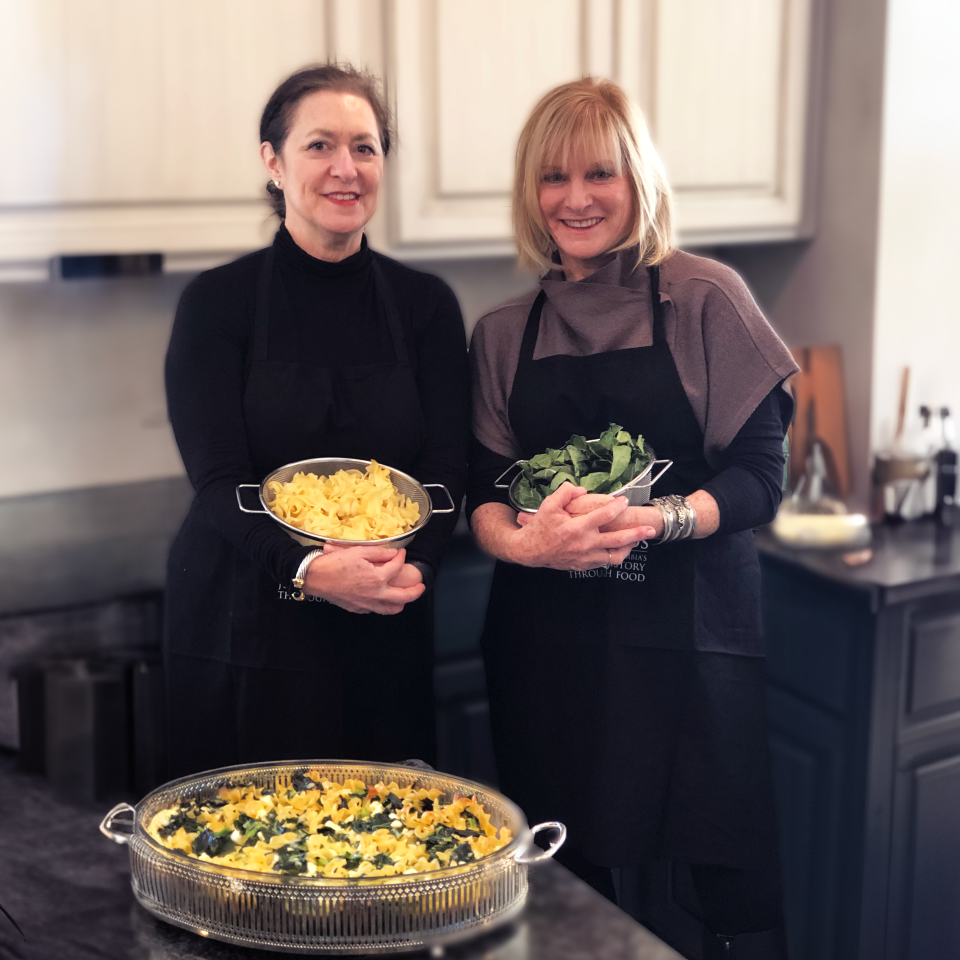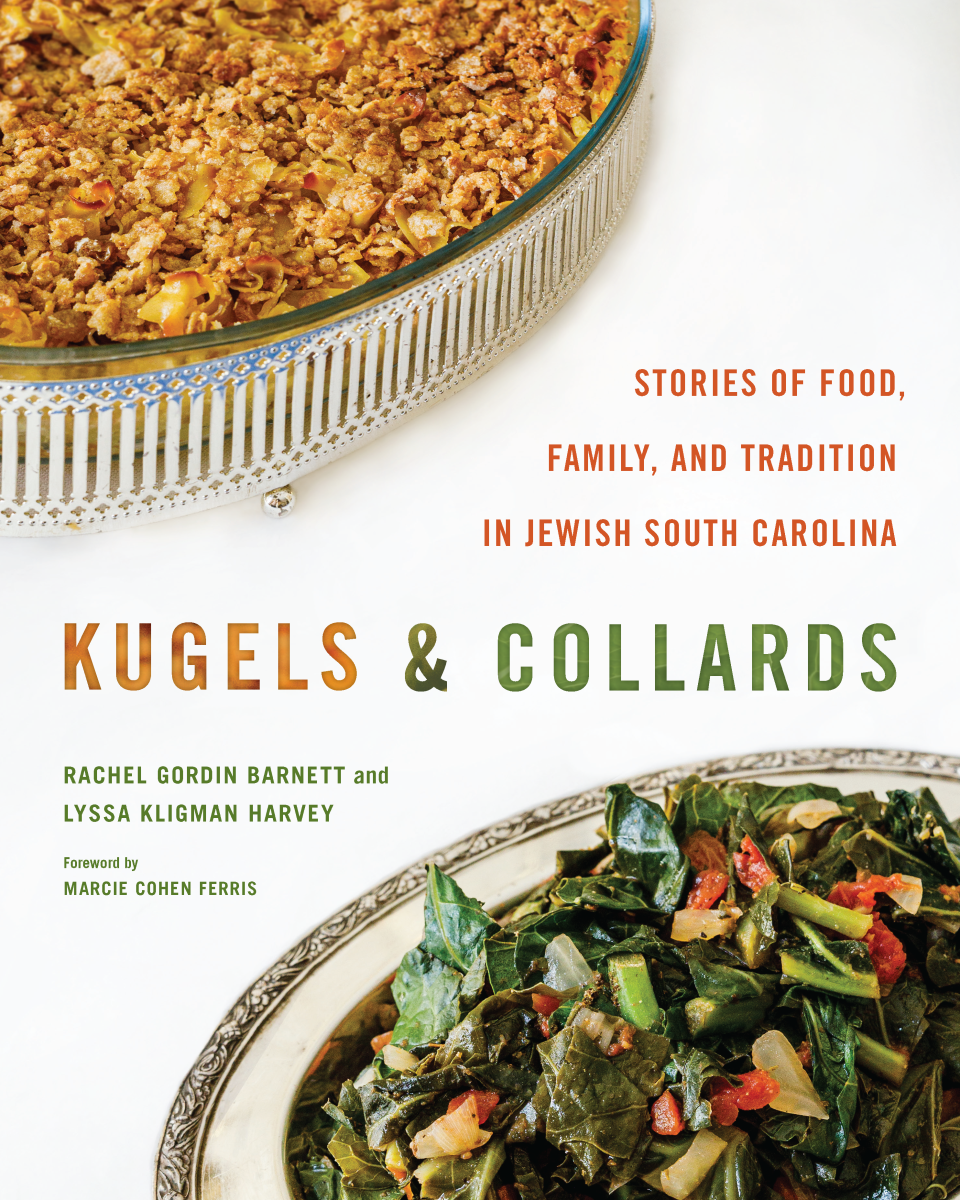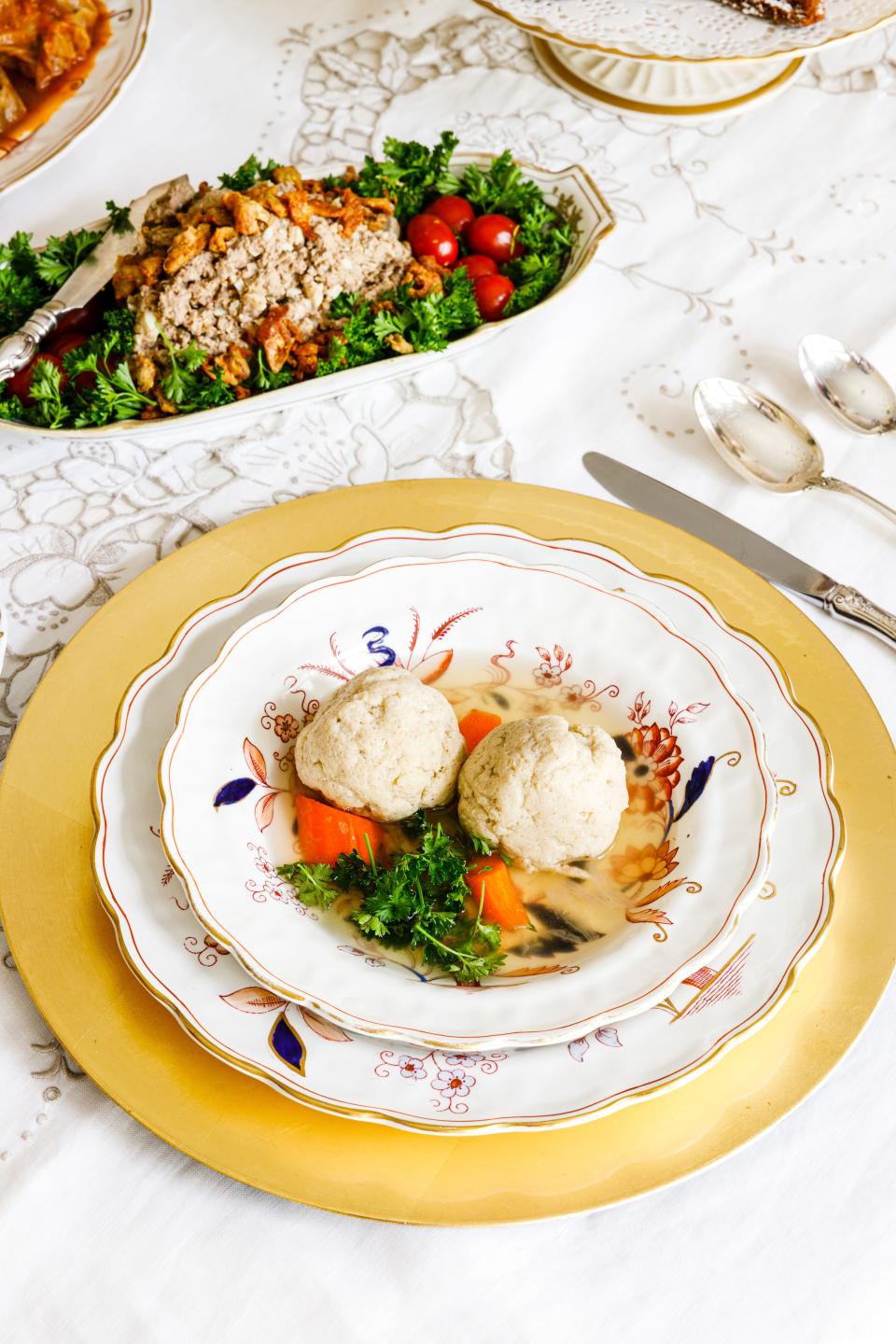Historic Savannah Foundation's lecture series begins with Jewish foodways in the South

“Through food, we can find out that there is more that connects us than that separates us.” - Dr. Jessica B. Harris, food historian and author
Rachel Barnett and Lyssa Harvey never set out to write a cookbook. What began as a cultural Jewish food quest turned the South Carolina natives and lifelong friends first into historical epicureans and later into authors.
A four-year endeavor saw them collect recipes and essays from Jewish families, initially in Columbia, South Carolina, and then all across the Palmetto State, that eventually evolved into Kugels and Collards: Stories of Food, Family, and Tradition in Jewish South Carolina.
With similar smiles in separate Zooms, Barnett and Harvey shared that the title could easily have been Chopped Liver and Fried Chicken.
Since the book was first published in August 2023, Barnett and Harvey’s tour has included stops in Atlanta, Charleston, Greenville, Memphis, New Orleans, Spartanburg, and now Savannah. On Thursday, April 18, the co-authors headline the Historic Savannah Foundation’s “Jewish Foodways in the Lowcountry South” event alongside Congregation Mickve Israel’s Rabbi Robert Haas.
“We feel a kinship with Savannah. There’s a shared history,” said Barnett. “Savannah’s Jewish community history is so deep and so rich, so I can’t wait to hear the stories.”
Those stories date back to the city's founding in 1733, when Congregation Mickve Israel was formed by 42 Jewish settlers, making it the third oldest Jewish congregation in America.

History meets recipe
Both Barnett and Harvey say that what they created is an anthology, a collected history, and by extension a cookbook, an archival document whose common ingredient is food.
“It’s a slice of South Carolina’s Jewish history,” said the former with a smile. “Four years in the making.”
“What we’ve discovered is that it has become an unintentional archive that happens to be stories of Southern Jews and others,” said Harvey, who still lives in her hometown of Columbia. “It’s the Southern Jewish table.”
For those who may not know, a lokshen kugel is a noodle pudding, and if you want to make one, try Grandma Ida’s lokshen kugel on page 12.
“It’s delicious,” said Barnett. “It’s Lyssa’s grandmother’s recipe.”
More than six years ago, Historic Columbia’s executive director Robin Waites gathered people from various organizations to talk about how to document the capital city’s Jewish history. The Jewish Historical Society of South Carolina, of which Barnett now serves as executive director, has been documenting oral histories for three decades.
“We collected oral histories, we put up markers, we developed a walking tour, all of it with Historic Columbia’s incredible, talented researchers,” she said.
Both confirmed foodies, Barnett and Harvey decided to take a different tack, wondering what they could do with Jewish cuisine.
“Food is different,” Barnett correctly contended. “Everybody has a story. Everybody remembers their bubbe’s brisket or their grandmother’s best chopped liver.”
“Fortunately for us, we had an incredibly talented team at Historic Columbia,” she continued, crediting Waites’ organization for developing a blog that posted every month for four years, collecting brief family histories, best recipes, and fondest family memories around food.

Barnett praised their “incredible mentors” Dale Rosengarten, the now retired curator of Jewish Heritage Collection at the College of Charleston, and Marcie Cohen Ferris, professor in the Department of American Studies at the University of North Carolina at Chapel Hill, who wrote the forward that chronicles when Jewish foodways began in the South.
“She started this before anybody else started talking about foodways of Jewish food,” the Summerton native said of Ferris. “She recognized the history behind this.”
“Every month at the Jewish Historical Society, we had a Zoom program with Judge Richard Gergel and Robert Rosen,” Barnett recalled. “We had three-hundred, four-hundred people tuning into these Zooms from all over the country.”
“We had plenty of Charleston and Columbia stories,” she said, “but this gave us the opportunity to reach people that we didn’t know who were out there, people who had grown up here and had moved away.”
A story from a woman in Brookline, Massachusetts, whose family hailed from Charleston. Another from a man in D.C. who grew up in Eutawville, South Carolina.
Making sure that they did not “apSavpropriate” anyone’s recipes, Harvey explained, they tried to retrace each to its owner.
“That was passion. We loved it,” Barnett said of hunting down photos and cooking up recipes. “I love the whole idea of collecting recipes and preserving them. It tells you so much about culture, and that is what we say to people.”
“Four years later, we had a book,” she said proudly.
Now in its second printing with the University of South Carolina Press, all proceeds from Kugels & Collards go to Historic Columbia and the Jewish Historical Society of South Carolina. In addition to this co-authorship, Barnett and Harvey are founding members of the Historic Columbia Jewish Heritage Initiative.

Savor your story
“Wherever we’ve been, we’ve met the nicest people. We want people to be engaged in this conversation,” said Barnett about the junket events. “We talk about the book a little bit and give them a couple really great stories and then say, ‘Now we want to hear from you. Tell us your stories.’”
In Memphis, attendees sat around in a big circle and shared their own familial food tales.
“It was so incredible,” Barnett recalled, “and what we find as we’ve done this is that these stories are not dissimilar to the stories we have in the book. There’s this collective experience, if you will.”
“I think the collective stories project a feeling across the board no matter what religion because it’s food and tradition and what they mean to you,” Harvey echoed. “That crosses all kinds of boundaries.
“Especially when it’s holidays, tradition,” she continued, “you know who’s going to be at that table and who’s not at that table, who’s missing, who’s gone, so it brings very poignant memories of food.”
“We say that this book marks time and place,” said Harvey, whose own recipe for the Star of David poppy seed cake, made in a namesake bundt pan, she makes for everything from sitting shiva to happy occasions.
“I’m Southern. I’m Jewish, and food is my love language. That kind of covers everything,” she said.
In Kugels & Collards and in their presentation, the authors credit African American cooks whose influence on Jewish families’ food traditions was crucial.
“We want to recognize their culinary contributions,” said Barnett of the book’s underlying theme, the African American influence and the Southern foods introduced by enslaved peoples. “They’re enormous. This is what made the Southern Jewish table.”
“We worked hard on this book for four years, but we didn’t get the impact of the book until other people told us their stories,” Harvey shared. “When we started taking it across the South, we realized that every single person could have written a story like this.
“To have these surviving memories means a whole to them and a whole lot to us.”
The authors sign all the books “Savor your story,” hoping that people have a takeaway from their familial food moments.
“Rachel and I always say that memories around the table are much more visceral, they’re much more sensory,” said Harvey, a teacher, therapist and artist whose life work has been helping children and impacting her community by creating the Columbia Holocaust Education Commission. “When you have anything that you can see, smell, and then taste, it evokes emotion.”
“Passover is in a couple of weeks, and it will be a time when families gather around the table,” said Barnett. “For us, it’s a good time to remind people there is a family recipe there. There’s something being served on your table that you need to make sure you write it down or pass it down so the next generation gets it.”
Harvey admitted that it was not until she was in her forties that she really “wanted to know” where her family’s food culture came from.
“Because of that and because of my children, I knew that they would be the holders of that tradition,” said Harvey. “I’ve become very intentional with how I remember things, how I set the table with my mother’s beautiful china and linen. I want it to resonate with my children, and now, as a grandmother of five, I know that they’re watching.”
If You Go >>
What: Historic Savannah Foundation’s “Jewish Foodways in the Lowcountry South,” part of its 2024 Lecture Series “People, Places and Stories That Define Savannah”
When: Wine reception at 5:30 p.m. and the discussion beginning at 6 p.m., April 18
Where: Historic Savannah Foundation’s headquarters, 321 E. York St.
Tickets: Reservations are recommended as space is limited. Attendance is free for Historic Savannah Foundation members and $15 for non-members. Members and non-members may RSVP by emailing Kendall Graham at kgraham@myhsf.org or by calling 912-233-7787 ext. 109.
Info: For more information about the HSF Lecture Series, visit myhsf.org.
This article originally appeared on Savannah Morning News: 'Kugels and Collards' savors long tradition of Jewish foodways in the South

